| Listing 1 - 5 of 5 |
Sort by
|
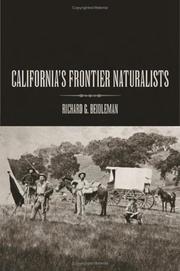
ISBN: 0520927508 9786612356339 128235633X 1598759213 9780520927506 1423745418 9781423745419 9781598759211 9780520230101 0520230108 9781282356337 6612356332 Year: 2006 Publisher: Berkeley : University of California Press,
Abstract | Keywords | Export | Availability | Bookmark
 Loading...
Loading...Choose an application
- Reference Manager
- EndNote
- RefWorks (Direct export to RefWorks)
This book chronicles the fascinating story of the enthusiastic, stalwart, and talented naturalists who were drawn to California's spectacular natural bounty over the decades from 1786, when the La Pérouse Expedition arrived at Monterey, to the Death Valley expedition in 1890-91, the proclaimed "end" of the American frontier. Richard G. Beidleman's engaging and marvelously detailed narrative describes these botanists, zoologists, geologists, paleontologists, astronomers, and ethnologists as they camped under stars and faced blizzards, made discoveries and amassed collections, kept journals and lost valuables, sketched flowers and landscapes, recorded comets and native languages. He weaves together the stories of their lives, their demanding fieldwork, their contributions to science, and their exciting adventures against the backdrop of California and world history. California's Frontier Naturalists covers all the major expeditions to California as well as individual and institutional explorations, introducing naturalists who accompanied boundary surveys, joined federal railroad parties, traveled with river topographical expeditions, accompanied troops involved with the Mexican War, and made up California's own geological survey. Among these early naturalists are famous names-David Douglas, Thomas Nuttall, John Charles Fremont, William Brewer-as well as those who are less well-known, including Paolo Botta, Richard Hinds, and Sara Lemmon.
Naturalists --- Scientific expeditions --- Natural history --- Historians, Natural --- Natural historians --- Scientists --- Expeditions, Scientific --- Scientific voyages --- Travels --- Voyages, Scientific --- Voyages and travels --- History. --- american west. --- botany. --- boundary surveys. --- california. --- david douglas. --- death valley. --- expedition. --- explorers. --- fieldwork. --- frontier. --- geological survey. --- geology. --- john fremont. --- la perouse. --- land development. --- land management. --- mexican war. --- monterey. --- natural sciences. --- natural world. --- naturalism. --- naturalist. --- nature. --- nonfiction. --- pacific northwest. --- paleontology. --- paolo botta. --- plants. --- railroads. --- richard hinds. --- sara lemmon. --- science. --- scientists. --- settling the west. --- thomas nuttall. --- united states. --- wild west. --- wilderness. --- william brewer. --- zoology.
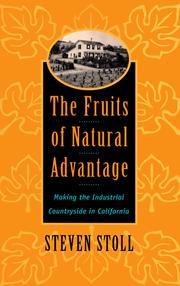
ISBN: 0520920201 1282356429 9786612356421 0585223130 9780520920200 9780585223131 0520211723 Year: 1998 Publisher: Berkeley, CA : University of California Press,
Abstract | Keywords | Export | Availability | Bookmark
 Loading...
Loading...Choose an application
- Reference Manager
- EndNote
- RefWorks (Direct export to RefWorks)
The once arid valleys and isolated coastal plains of California are today the center of fruit production in the United States. Steven Stoll explains how a class of capitalist farmers made California the nation's leading producer of fruit and created the first industrial countryside in America. This brilliant portrayal of California from 1880 to 1930 traces the origins, evolution, and implications of the fruit industry while providing a window through which to view the entire history of California.Stoll shows how California growers assembled chemicals, corporations, and political influence to bring the most perishable products from the most distant state to the great urban markets of North America. But what began as a compromise between a beneficent environment and intensive cultivation ultimately became threatening to the soil and exploitative of the people who worked it.Invoking history, economics, sociology, agriculture, and environmental studies, Stoll traces the often tragic repercussions of fruit farming and shows how central this story is to the development of the industrial countryside in the twentieth century.
Fruit trade --- Fruit --- Horticulture --- Agriculture --- Horticultural science --- Horticultural sciences --- Gardening --- Fruits --- Pomology --- Food --- Food crops --- Horticultural crops --- Horticultural products --- Plants --- Fruit industry --- Produce trade --- Marketing. --- Economic aspects --- Marketing --- agriculture. --- american west. --- california growers. --- california. --- capitalism. --- citrus. --- coastal plains. --- cultivation. --- economics. --- environmental impact. --- environmental studies. --- farming. --- food and agriculture. --- food studies. --- frontier. --- fruit farming. --- fruit industry. --- fruit production. --- fruit. --- history. --- industrial countryside. --- land development. --- nonfiction. --- produce. --- rural. --- settling the west. --- sociology. --- soil studies.
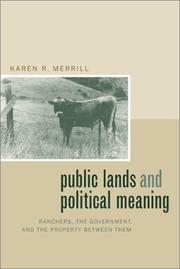
ISBN: 0520926889 1597348384 9780520926882 0585419779 9780585419770 9781597348386 9780520228627 0520228626 0520228626 Year: 2002 Publisher: Berkeley : University of California Press,
Abstract | Keywords | Export | Availability | Bookmark
 Loading...
Loading...Choose an application
- Reference Manager
- EndNote
- RefWorks (Direct export to RefWorks)
The history of the American West is a history of struggles over land, and none has inspired so much passion and misunderstanding as the conflict between ranchers and the federal government over public grazing lands. Drawing upon neglected sources from organized ranchers, this is the first book to provide a historically based explanation for why the relationship between ranchers and the federal government became so embattled long before modern environmentalists became involved in the issue. Reconstructing the increasingly contested interpretations of the meaning of public land administration, Public Lands and Political Meaning traces the history of the political dynamics between ranchers and federal land agencies, giving us a new look at the relations of power that made the modern West.Although a majority of organized ranchers supported government control of the range at the turn of the century, by midcentury these same organizations often used a virulently antifederal discourse that fueled many a political fight in Washington and that still runs deep in American politics today. In analyzing this shift, Merrill shows how profoundly people's ideas about property wove their way into the political language of the debates surrounding public range policy. As she unravels the meaning of this language, Merrill demonstrates that different ideas about property played a crucial role in perpetuating antagonism on both sides of the fence.In addition to illuminating the origins of the "sagebrush rebellions" in the American West, this book also persuasively argues that political historians must pay more attention to public land management issues as a way of understanding tensions in American state-building.
Public lands --- Government ownership --- Ranchers --- Pasture, Right of --- Agistment --- Grazing rights --- Pastures --- Right of pasture --- Animal industry --- Commons --- Natural resources, Communal --- Servitudes --- Ranchmen --- Stockmen (Animal industry) --- Farmers --- Nationalization --- Public ownership --- Socialization of industry --- State ownership --- Collectivism --- Economic policy --- Socialism --- Privatization --- History. --- Legal status, laws, etc. --- Law --- Law and legislation --- History --- Legal status, laws, etc --- E-books --- american history. --- american west. --- cattle. --- environment. --- federal government. --- federal land agencies. --- frontier. --- government control. --- grazing lands. --- history. --- land administration. --- land management. --- land rights. --- land use. --- modern west. --- nature. --- political science. --- politics. --- property rights. --- protest. --- public grazing. --- public lands. --- public range. --- ranchers. --- ranching. --- range. --- sagebrush rebellions. --- settlers. --- settling the west. --- social issues. --- state building. --- united states. --- wild west.
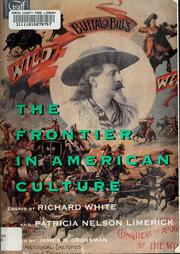
ISBN: 1283382121 9786613382122 0520915321 0585115508 9780520915329 9780585115504 9780520088436 0520088433 9780520088443 0520088441 0520088433 0520088441 9781283382120 6613382124 Year: 1994 Publisher: Chicago : Berkeley : Library ; University of California Press,
Abstract | Keywords | Export | Availability | Bookmark
 Loading...
Loading...Choose an application
- Reference Manager
- EndNote
- RefWorks (Direct export to RefWorks)
Log cabins and wagon trains, cowboys and Indians, Buffalo Bill and General Custer. These and other frontier images pervade our lives, from fiction to films to advertising, where they attach themselves to products from pancake syrup to cologne, blue jeans to banks. Richard White and Patricia Limerick join their inimitable talents to explore our national preoccupation with this uniquely American image. Richard White examines the two most enduring stories of the frontier, both told in Chicago in 1893, the year of the Columbian Exposition. One was Frederick Jackson Turner's remarkably influential lecture, "The Significance of the Frontier in American History"; the other took place in William "Buffalo Bill" Cody's flamboyant extravaganza, "The Wild West." Turner recounted the peaceful settlement of an empty continent, a tale that placed Indians at the margins. Cody's story put Indians-and bloody battles-at center stage, and culminated with the Battle of the Little Bighorn, popularly known as "Custer's Last Stand." Seemingly contradictory, these two stories together reveal a complicated national identity.Patricia Limerick shows how the stories took on a life of their own in the twentieth century and were then reshaped by additional voices-those of Indians, Mexicans, African-Americans, and others, whose versions revisit the question of what it means to be an American.Generously illustrated, engagingly written, and peopled with such unforgettable characters as Sitting Bull, Captain Jack Crawford, and Annie Oakley, The Frontier in American Culture reminds us that despite the divisions and denials the western movement sparked, the image of the frontier unites us in surprising ways.
Frontier and pioneer life --- Border life --- Homesteading --- Pioneer life --- Adventure and adventurers --- Manners and customs --- Pioneers --- History --- Turner, Frederick Jackson, --- Buffalo Bill, --- Cody, William Frederick, --- Cody, William F. --- Bill, --- Cody, W. F. --- Cody, Buffalo Bill, --- Cody, Bill, --- Tʻe-na, --- Tʻe-na, Fo-lei-te-li-kʻo Chieh-kʻo-hsün, --- Turner, F. J. --- F. J. T. --- T., F. J. --- West (U.S.) --- American West --- Trans-Mississippi West (U.S.) --- United States, Western --- Western States (U.S.) --- Western United States --- Exhibitions --- Exhibitions. --- West (U. S.) --- History of North America --- anno 1800-1999 --- american culture. --- american hero. --- american history. --- american west. --- annie oakley. --- buffalo bill. --- columbian exposition. --- cowboys. --- custer. --- empty continent. --- folk tales. --- folklore. --- frontier. --- indians. --- indigenous peoples. --- jack crawford. --- land rights. --- little bighorn. --- log cabins. --- manifest destiny. --- military. --- national identity. --- native americans. --- nonfiction. --- oregon trail. --- pioneers. --- popular culture. --- settler colonialism. --- settlers. --- settling the west. --- sitting bull. --- wagon trains. --- western movement. --- western. --- wild west show. --- wild west.
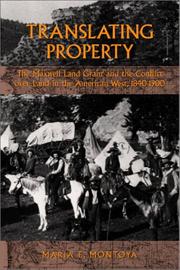
ISBN: 052092648X 1597349623 9780520926486 9781597349628 9780520227446 0520227441 0585466408 9780585466408 Year: 2002 Publisher: Berkeley : University of California Press,
Abstract | Keywords | Export | Availability | Bookmark
 Loading...
Loading...Choose an application
- Reference Manager
- EndNote
- RefWorks (Direct export to RefWorks)
Although Mexico lost its northern territories to the United States in 1848, battles over property rights and ownership have remained intense. This turbulent, vividly narrated story of the Maxwell Land Grant, a single tract of 1.7 million acres in northeastern New Mexico, shows how contending groups reinterpret the meaning of property to uphold their conflicting claims to land. The Southwest has been and continues to be the scene of a collision between land regimes with radically different cultural conceptions of the land's purpose. We meet Jicarilla Apaches, whose identity is rooted in a sense of place; Mexican governors and hacienda patrons seeking status as New World feudal magnates; "rings" of greedy territorial politicians on the make; women finding their own way in a man's world; Anglo homesteaders looking for a place to settle in the American West; and Dutch investors in search of gargantuan returns on their capital. The European and American newcomers all "mistranslated" the prior property regimes into new rules, to their own advantage and the disadvantage of those who had lived on the land before them. Their efforts to control the Maxwell Land Grant by wrapping it in their own particular myths of law and custom inevitably led to conflict and even violence as cultures and legal regimes clashed.
Land tenure --- Agrarian tenure --- Feudal tenure --- Freehold --- Land ownership --- Land question --- Landownership --- Tenure of land --- Land use, Rural --- Real property --- Land, Nationalization of --- Landowners --- Serfdom --- History --- Maxwell Land Grant (N.M. and Colo.) --- New Mexico --- Beaubien-Miranda Grant (N.M. and Colo.) --- Miranda-Beaubien Grant (N.M. and Colo.) --- Nuevo México --- Nuevo Méjico --- History. --- Race relations. --- Nuebo México --- Departamento del Nuevo Mejico --- american west. --- chicano. --- colonialism. --- colorado. --- ethnicity. --- frontier. --- history. --- homestead act. --- indigenous people. --- indigenous rights. --- land development. --- land grant. --- land rights. --- legal history. --- lucien maxwell. --- mexican americans. --- mexican governors. --- mexican history. --- mexico. --- native american. --- new mexico. --- pioneers. --- race. --- settler colonialism. --- settlers. --- settling the west. --- southwest. --- squatters. --- supreme court. --- treaties. --- treaty of guadalupe hidalgo. --- us courts. --- wild west.
| Listing 1 - 5 of 5 |
Sort by
|

 Search
Search Feedback
Feedback About
About Help
Help News
News